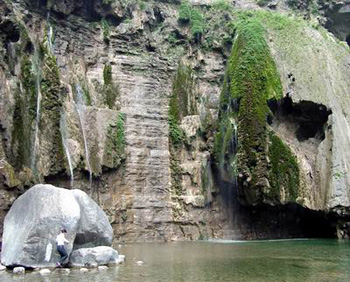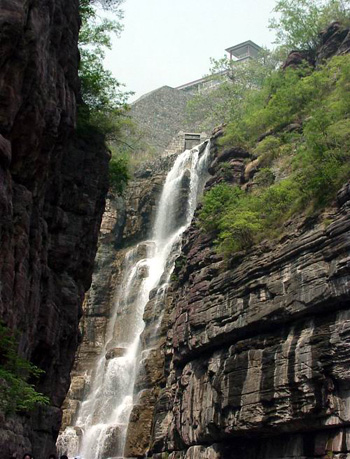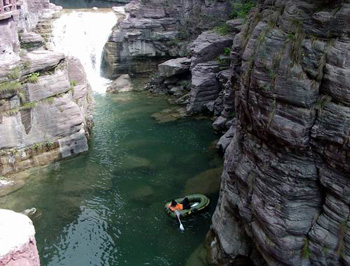| Home / English Column / Environment / Environment -- What's New | Tools: Save | Print | E-mail | Most Read |
| Yuntai Mountain Undergoes Rapid Development |
| Adjust font size: |
A scientific management system combined with environmental protection is key to the sustainable development of geoparks, said a leading official with the Yuntai Mountain Geopark Administrative Bureau. Han Yueping, the bureau's director, said that the Yuntai Mountain Geopark had allocated a hefty investment for environmental protection over the past few years. "With the investment, we have achieved a balance between the geopark's development and environmental protection," Han said. According to Han, operations of 117 mines have been suspended, in a bid to protect the mountain's natural landscape. Profile The Yuntai Mountain Geopark is located in the north of Xiuwu County, in the city of Jiaozuo in central China's Henan Province. It is characterized by its structural cuesta, flying waterfalls on faulted cliffs, quiet valleys and clear springs. Known as a world geopark, visitors have begun to learn about the mountain, a new site in the tourism glossary. It was one of the first world geoparks to be approved by the United Nations Educational, Scientific and Cultural Organization (UNESCO) in 2004.
At present, China has 85 national geoparks and eight world geoparks approved by UNESCO. "In the past, local farmers used firewood by chopping tress in the mountain. However, their awareness of forest protection was immediately enhanced after the geopark's establishment brought remarkable economic benefits to them," Han said. According to Han, farmland within the mountain that is comprised of an area of 1,200 mu (80 hectares) has been converted into forest. "We also invited foreign experts to take part in the grain-for-green project, with the aim of preserving the natural environment of the mountain," Han said. Infrastructure In a further development, the geopark invested more than 40 million yuan (US$5 million) last year in buying 100 state-of-the-art sightseeing buses, which help reduce pollution from tail gas emissions. It will order 20 more such buses. Along with environmental protection, the geopark has also earmarked a huge investment in building infrastructure. In 2003, it invested about 27 million yuan (US$3.37 million) to upgrade the electricity and communication systems. In addition, more than 100 million yuan (US$12.5 million) was invested to build four large parking lots that can accommodate 5,000 cars within the park. Han said that more than 150 million yuan (US$18.75 million) would be invested into the digital project construction this year. He said that the improved natural environment has benefited not only the geopark but also people living around the mountain. For example, the per capita annual income in the Anshang Village was only 260 yuan (US$32.5) in 2000, but the figure reached about 50,000 yuan (US$6,250) last year, according to Han. "Many villagers here used to farm around the mountain for a living, but now they have engaged in the tourist service sector, such as opening household hotels for visitors," Han said. In 2001, when Han was appointed the director of the geopark's administrative bureau, the Yuntai Mountain scenic spot only received 200,000 visitors per year, with a meager revenue of 4 million yuan (US$500,000). "Yuntai Mountain, at that time, was not a household name among Chinese tourists, let alone people from overseas," said Han, adding that there were almost no infrastructure facilities at the tourist site.
However, Yuntai Mountain has now developed into one of the leading scenic sites in Henan Province and one of the leading geoparks in China, after years of efforts to improve the environment, Han said. It received 1.7 million people last year, with ticket sales revenue hitting more than 120 million yuan (US$15 million), according to Han. Moreover, it realized a ticket sales revenue of more than 20 million yuan (US$2.5 million) during the week-long May Day holiday this year. The Yuntai Mountain, with a sightseeing area of 190 square kilometers, was also included in the first batch of national natural heritage sites in 2002. "This recognition, together with UNESCO's approval as one of the world's geoparks, will definitely enhance the mountain's image at home and abroad," Han said. According to Han, Yuntai Mountain is now applying for recognition as one of the country's Five-A level tourist sites, and will later apply for inclusion into the world's natural heritage list.
(China Daily July 7, 2006)
|
| Tools: Save | Print | E-mail | Most Read |
 |
| Related Stories |




